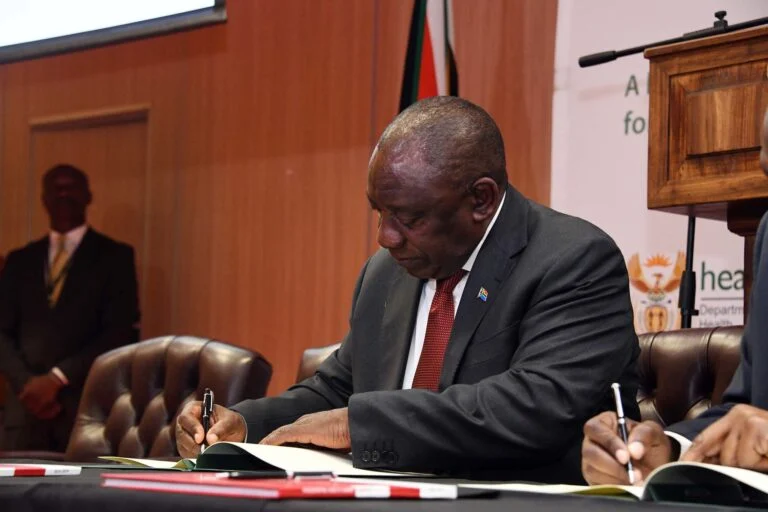
On April 1, 2025, South African President Cyril Ramaphosa made a significant move towards shaping the country’s future by signing a set of critical new laws aimed at enhancing the nation’s governance, economic stability, and social justice. The new legislation, passed after months of rigorous debates and consultations, is seen as a cornerstone in Ramaphosa’s broader strategy to address long-standing challenges facing the country, including unemployment, corruption, and economic inequality.
Among the most significant laws signed into effect is the Economic Recovery and Job Creation Act. This law is designed to boost South Africa’s struggling economy by offering incentives to local businesses, attracting foreign direct investment, and stimulating job creation. The Act includes provisions for tax relief, subsidies for small and medium enterprises (SMEs), and a comprehensive approach to skills development aimed at addressing the country’s high youth unemployment rate.
In addition, the government introduced a Transparency and Anti-Corruption Act that strengthens measures against corruption at all levels of government. This includes the establishment of a new independent commission with powers to investigate public officials and enforce transparency in government contracts. The law is a direct response to years of systemic corruption allegations within various public institutions and aims to restore trust in the country’s leadership.
Another landmark piece of legislation is the Land Reform and Redistribution Act, which seeks to accelerate the redistribution of land to South Africa’s historically disadvantaged communities. The law outlines clear procedures for the expropriation of land without compensation, prioritizing communities that were forcibly removed during apartheid. While the bill has been met with both support and opposition, it marks a decisive step toward addressing the deep-rooted land inequalities in South Africa.
Ramaphosa also signed the Environmental Sustainability and Climate Action Act, which aims to position South Africa as a leader in the fight against climate change. The Act outlines new regulations for reducing carbon emissions, promoting renewable energy, and creating a green economy. South Africa, as a major emitter of greenhouse gases due to its reliance on coal, has been under increasing international pressure to adopt more stringent environmental policies. This legislation seeks to balance economic growth with environmental protection, ensuring that the country meets global sustainability goals.
The signing of these laws has been met with mixed reactions. Supporters of Ramaphosa’s government hailed the legislation as a bold step towards economic recovery and social justice. This is a historic moment for South Africa, said Thuli Madonsela, a prominent former Public Protector. These laws have the potential to reshape the trajectory of the nation for generations to come.
However, critics argue that the laws may face significant challenges in implementation. The opposition party, the Democratic Alliance (DA), has voiced concerns over the potential for the land reform law to exacerbate tensions in rural areas and hinder agricultural productivity. Similarly, concerns have been raised regarding the transparency of the new anti-corruption commission, with some fearing that it could be used for political purposes.
In a statement following the signing ceremony, President Ramaphosa emphasized that the new laws were a culmination of years of dialogue and reflection on South Africa’s current trajectory. Today, we are making a commitment to our people that we will work towards a South Africa that is prosperous, fair, and free from corruption. These laws are a testament to our dedication to creating an inclusive economy and a transparent government, Ramaphosa said.
He further outlined that the government will work closely with civil society, business leaders, and international partners to ensure the successful implementation of the new laws. “These laws are just the beginning. Our work is far from over. We must now focus on enforcement and tangible outcomes that improve the lives of every South African.
The passage and signing of these new laws represent a pivotal moment in South Africa’s post-apartheid history. While the road ahead remains challenging, the ambitious reforms signal a renewed commitment to addressing the complex issues of inequality, economic growth, and governance. For President Cyril Ramaphosa, this is a defining moment in his presidency, one that could determine his legacy as a leader who navigated South Africa through one of its most transformative periods in modern history. As the country embarks on this new era, all eyes will be on the government’s ability to turn these ambitious legal frameworks into real, tangible change for the people of South Africa.

